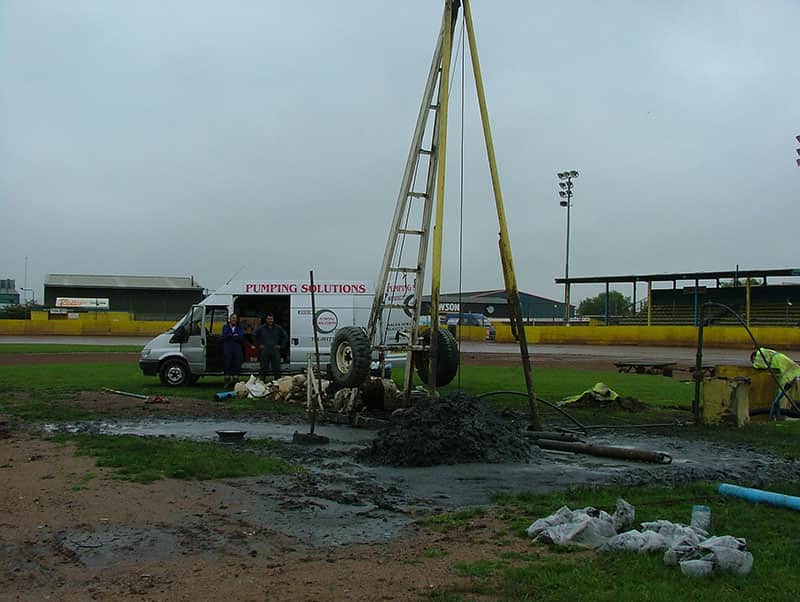
Get In Touch With Pumping Solutions
Why Should You Consider a Borehole?
Boreholes have been a source of water for centuries. Despite this, their benefits are still relatively unknown to a lot of business owners. A borehole is a general term used to describe a deep hole intended to tap a natural resource, whether that be water, oil, or another liquid.
The Primary Benefits of Using a Borehole
The most common use of boreholes is as a self-sufficient water source for businesses. A deep hole is drilled down to the water source, the sides of the well are secured and a pump is installed to draw the water to the surface. But why would a business choose to invest in installing their own water source, rather than using a mains water source? There are a number of benefits to boreholes that we’ve examined in this article.
The Self-Sufficient Edge
Many consumers cite the fact that boreholes provide a self-sufficient edge as their primary benefit. The water contained within these holes has accumulated as a result of rain and natural run-off, so the consumer is merely accessing a resource that has accumulated as a result of the topography of their region. There is, therefore, no reliance on third party machinery or processes for the water supply. While mains can encounter problems from time to time, boreholes are completely independent of such risks. Some of the issues which can be avoided by using this type of commercial water source include:
- Supply problems.
- Faulty valves or burst pipes.
- Low flow rates during times of high demand.
Boreholes offer a continuous supply of water at constant pressure. Furthermore, the chances of a fault are dramatically reduced due to the fact that the entire system is only meant to serve a single property. For example across just England and Wales alone, almost 660 million gallons of water is lost every single day due to leaks, this is equivalent to 1,180 Olympic sized swimming pools full of water. This is just one of the many problems that can happen with mains water systems, leaving you with problems accessing your water which wouldn’t happen if you had your own private supply of water. Boreholes are much more reliable meaning you won’t have to worry about problems in the mains system.
Economic Advantages
Water is a natural resource that has grown increasingly expensive over time. In fact, some studies have found that the cost of this liquid has risen by as much as 82% within some regions of the United Kingdom (1). A borehole accesses an existing supply of water; completely eliminating any type of middleman from the picture. It is also worth noting that there are advanced filtration methods available; ideal for those who plan on drinking the water that emerges from the ground. On a final note, UK regulations stipulate that the consumer has the right to draw up to 20 cubic metres of water or 4,400 gallons from the ground every day without having to apply for a license.
The Potential for a Financial Return
Not only can this type of commercial water source save money, but it may also help consumers turn a profit. There are two primary reasons for this observation. First, a borehole is considered to be a type of building improvement. Similar to other systems such as solar panels or a new roof, a borehole can add value to a commercial property. The UK government estimates that any improvements intended to save energy can increase the value of a property by as much as 14% (2).
As well as this you could end up saving yourself thousands of pounds every single year. For example, if you did use 4,400 gallons of water per day, (which is the maximum you can use for free) it would, on average, cost about £40 from a utility provider and that is just for the water alone. When you add on the standing and sewer charges you are looking at about £110 per day so if you are a company that uses a large amount of water like this every day you could be saving yourself up to around £28,600 per year (based on a 5 day work week).
The Financial and Environmental Edge
Ultimately, these resources are able to provide invaluable benefits to the modern property owner. Although the principle of boreholes has changed little over the years, there is no doubt that their commercial and financial appeal is on the rise. We should also mention that these are environmentally friendly means to access a liquid which is vital to our very survival. Enjoying this “liquid” asset has never been easier.
Using a borehole is great as it is a sustainable natural water source and could be argued it is even better than mains water. 60% of all mains water is recycled wastewater which of course is great that is getting reused but it will use a lot of energy to clean the water to a point that it is safe to drink. With a borehole, the water is coming straight out of the ground so there is no contamination or need for in-depth cleaning.
Sources:
- http://www.theguardian.com/money/2013/feb/09/rising-water-bills-profits
- https://www.gov.uk/government/news/energy-saving-measures-boost-house-prices
Did you find this article helpful? Discover more articles like this in our blog, or check out our sevices page to see how we can help you!

